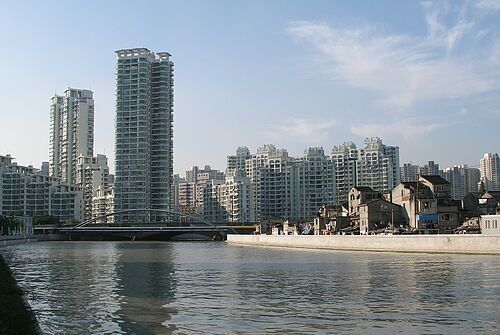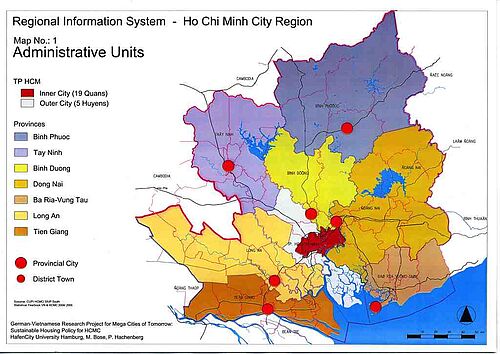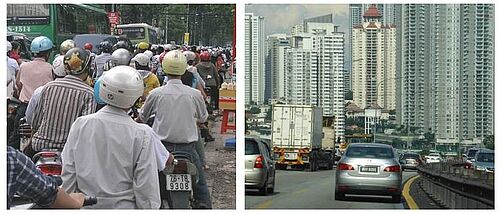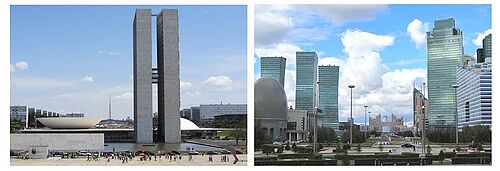

- Bose, M. (2009), Anforderungen an den Stadtumbau auf regionaler Ebene in der mega-urbanen Region Ho Chi Minh City, in: Altrock, U. u.a., Megacities und Stadterneuerung, Jahrbuch Stadterneuerung 2009, S. 129-136
- Bose, M. (2008), Nachhaltige räumliche Entwicklung megaurbaner Regionen-Ho Chi Minh City, in: PlanerIn, (1), S. 42-45.
- Bose, M. (2007), Regionale Strategien für eine nachhaltige Wohnungspolitik in Ho Chi Minh City, Vietnam, in: Pacific News, (27), S. 11-13.
- Waibel, M., Eckert, R., Bose, M. and Martin, V. (2007), Housing for Low-income Groups in Ho Chi Minh City between Re-Integration and Fragmentation – Approaches to Adequate Urban Typologies and Spatial Strategies. In: ASIEN 103, pp. 59-78.

- Panel discussion and presentation on the conference of the Goethe-Institut Hanoi: Comprehensive strategies for urban traffic and urban transport and integrative implementation. Requirements for a sustainable urban development in Vietnam. Organized by German Embassy VN, Goethe-Institut VN, GIZ VN and DAAD VN, 22.-23.06.2011, Hanoi
- Bose, M. (2013), Verschiedene Geschwindigkeiten in der Entwicklung der megaurbanen Region HCMC und des Verkehrs, in: Waibel, M. (Hg.): Ho Chi Minh MEGA City, Berlin
- Bose, M. (2011), Nachhaltiger städtischer Verkehr in Vietnam – Hindernisse und Anforderungen, in: Bass, H. H.; Biehler, C.; Tuan, L. H.: Auf dem Weg zur nachhaltigen zu nachhaltigen städtischen Transportsystemen. Ein deutsch-vietnamesischer Dialog über die Zukunft der Stadt und die Stadt der Zukunft, S. 37-58, München

A comparative study of capital cities built in the 20th century: An analysis of planning ideas, implementation and changes as well as current challenges in urban development.
For several decades German planning practice has been focussed on planning within existing building structures, on urban renewal and conversion. In view of the demographic change and low economic growth rates the planning of urban expansion in the form of new city districts or even completely new cities is hardly discussed. Some experts principally doubt that whole cities can be planned.
Year after year a large number of new mega cities arise in the fast growing Developing Countries and Emerging Countries. Whole new cities are being planned by international architecture and planning offices, state-owned planning agencies or by globally acting construction companies. Future forecasts predict a further very fast increasing trend of urbanization. This requires a set of promising criteria, visions, concepts and implementation strategies for sustainable urban development.
The analysis of success and failure of planning and implementation of cities built in the past century can give valuable information and advice for future planning. Although the new capital cities of the 20th century are special cases in new city building they are a suitable subject of investigation for urban and regional planning ideas as well as their implementation for several reasons. Both public authorities and planners of new capital cities were ambitious to develop representative capitals for the needs of the respective countries. All this ideas tried to meet the most up-to-date concepts, methods and strategies of urban planning. Next to their purpose of representation and formation of a national identity the capitals therefore are outstanding examples for the prevailing ideas of urban planning and design at their time of creation. Hence they illustrate the change of the understanding of urban planning during one century.
The aim of the research project is to analyse the different concepts, the chosen implementation strategies and their modifications up to today as well as the current demands of urban development. It is to examine how flexible planners reacted to changing social, economic, political and technical conditions. As a result of this comparative study the urgent challenges for a sustainable urban development of the analysed capital cities in the 21st century will be described.
Contacts, interviews and site visits within the research project 2012 – 2014
19.08.2012 – 12.09.2012
Gaborone/Botswana
Lilongwe/Malawi
Dodoma and Dar es Salaam/Tansania
03.12.2012
Interview concerning Abuja/Nigeria with a member of management of Albert Speer & Partner GmbH in Frankfurt
02.01.2013
Interview concerning his collaboration on capital city planning of Dodoma/Tanzania and Abuja/Nigeria with Arch. Michael Nuss, former employee of PPAL/Toronto, ASP Frankfurt and Julius Berger Nigeria, in Darmstadt
21.01.2013
Interview concerning capital city planning of Canberra/Australia with Prof. Dr. Friedhelm Fischer, University of Kassel/University of Sydney, and Prof. James Weirick, University of Sydney, in Kassel
17.02.2013 – 28.02.2013
Islamabad/Pakistan
Chandigarh/India
16.08.2013 – 30.08.2013
Brasilia and Rio de Janeiro/Brazil
14.09.2013 – 20.09.2013
Astana/Kazakhstan
05.06.2014 – 22.06.2014
Putrajaya and Kuala Lumpur/Malaysia



